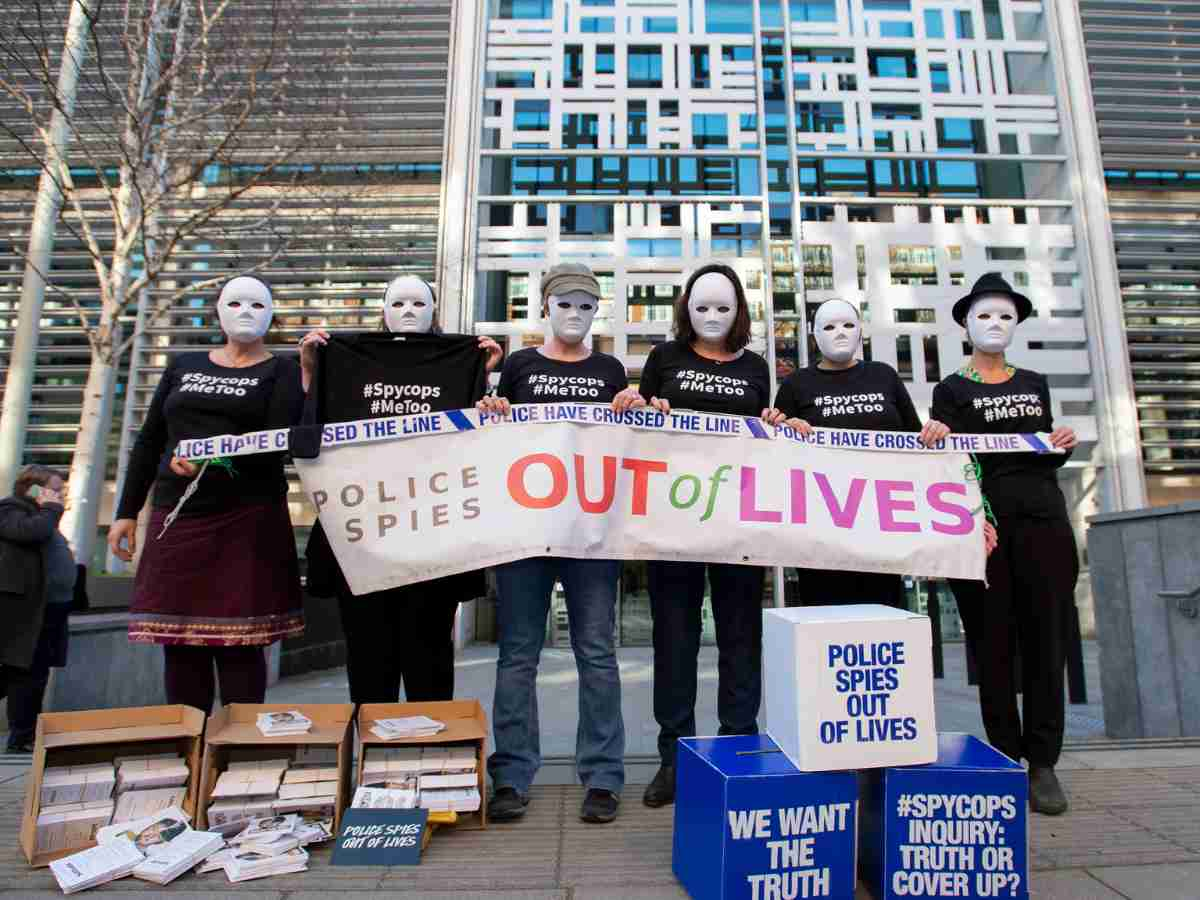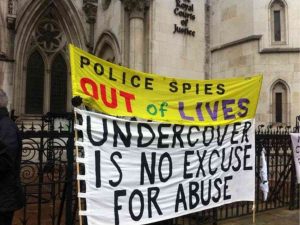In the run-up to the next part of the Spycops Undercover Policing Inquiry, which will begin on 30 September, the Canary spoke to Jessica. She, along with other women, is involved in ongoing civil claims. She described how an undercover officer groomed her when she was a vulnerable 19-year-old “for no reason”. A key takeaway for her from the inquiry is “the absolute pointlessness” of what the police spies did.
The Spycops scandal saw secretive police units use undercover officers for decades to infiltrate activist groups. And speaking about this, Jessica insisted that “the institutional sexism along with the institutional racism and institutional corruption and institutional misogyny… play a massive part in everything that they did”. She added “the more we find out, the worse it looks”.
See our full interview with Jessica below, and check out the trailer of the excellent documentary The Spies Who Ruined Our Lives here.
Spycops: they’re still trying to justify it
THE CANARY: How do you feel the Spycops inquiry is going?
JESSICA: There are some really interesting bits that are coming out, particularly listening to the officers give evidence. It’s very difficult to listen to. In this last phase, there’ve been a few of the officers that have been particularly offensive to actually listen to. But overall, what I’m taking away from it is just the absolute pointlessness of what they did, of all the spying, when they were sending back reports saying ‘this group is not gonna be overthrowing the government’.
It’s just ordinary people that they were spying on and still, even now, some of them are trying to justify it by saying, ‘well, there was of course the potential there for overthrowing the government, if all 12 of them got out of bed on the same day’. It feels ridiculous. At times, it feels like a bit of a farce, some of the stuff that they’re saying. At times, you can see the inquiry team sort of laughing at some of the things that are being suggested by the officers.
I’m building up to having to give my evidence in the next few months. So I’m kind of filled with a bit of dread for actually having to go through this myself.
“One-sided”
It isn’t going to be easy. And also, it feels as though the core participants have been a really secondary thought to the inquiry. Some of these police officers have had these documents for years. But we are getting hundreds of documents handed over, after all these redactions are made, and we get weeks to try and read through all of these to make our own statements. Then eventually, after finishing making our statements, we then get more documents which obviously we can’t comment on.
It’s so one-sided. The whole thing is one-sided. Some people haven’t been able to get statements in because they wanted all their disclosure first, and their disclosures are still coming. So we’ve been given deadlines. We’ve then missed these deadlines. I’m not sure what’s gonna happen. It seems that the police have been given every opportunity to take as long as they possibly can to miss deadlines with no consequences. It’s a particularly one-sided process.
But at the same time, there have been a few star interviews of the officers. And I think you can hear that the people asking officers questions are not impressed with the answers. It looks particularly bad for the police.
“I need answers” over Spycops
Do you think the whole Spycops inquiry process is a bit of a farce?
Not the inquiry. I think the SDS [Special Demonstration Squad] was a bit of a farce. But we need the answers. That’s why I’ve continued for all these years with the process. It’s because I need answers. I need to know exactly what parts of my life were controlled by other people, who was actually who in my life, what decisions I made myself and which ones I was pushed into.
Apart from the fact of having a relationship with one of the officers, there’s quite a lot of my personal history that has been used by that particular officer and other officers – things like I’m also in a family who had a dead child in the family. My brother was killed at a young age. And because the officer I had the relationship with wrote the tradecraft manual where he states, ‘if possible, use the identity of a dead child that had an unremarkable death’, and that was adopted. That describes my brother. So I’m having to ask the inquiry whether my brother’s identity was used by another officer. I’ve got a lot personally riding on results coming out of this inquiry.
That’s the thing that drives all of us. We just need to know the truth about what actually happened.
Shocking exploitation
Was this use of dead children’s identities one of the most shocking elements of everything that happened?
Yeah. It particularly hits a nerve. Listening to the statements of the families of the dead children and how it has affected them and knowing a few of them as well, it’s particularly hard. And that is a triggering point for me. Because I don’t know if I’m in that situation. But I can empathise. That seems to be one of the things that none of these other officers could do – to actually empathise with people. It’s one of the worst things that can happen to anyone. It destroys families. And yeah, it was just exploited by these scumbags.
It’s a massive issue for me, yes. There were plenty of other things that they did that were disgusting. But this, from the very start, it is ghoulish and an abhorrent practice.
What was the most disgusting aspect of what happened to you personally?
The thing that has given me the most sleepless nights over the past years is the age that I was, and how vulnerable I was as a teenager. I was 19. At that age, and also with the things like losing my brother, I was vulnerable. I had a whole set of my own issues, all of which were exploited by someone who I thought was 24 but turns out was 32 and married. It makes me feel disgusting. Because he was just some dirty, creepy old man. And that’s been awful.
I’ve described it right from the start as ‘I was groomed’. That’s not saying I was underage or anything. I’ve never ever said that. I was vulnerable. I was 19. But he was a grown-arse man, you know, married and a police officer for a number of years, and someone trained to spot things in others like vulnerability and the potential for exploitation. And he was in that position where he just completely manipulated me, and for no reason.
I’ve had a lot of disclosure now. And it’s hard for him to make a case that I should have been spied on in the first place. The one criminal act that I took part in at that age, which was rescuing chickens from a battery farm, you know, he drove us all there. So what they’re claiming – and what, in particular, he’s claiming – is just not true.
Willful denial by Spycops
Also, the fact that he’s still denying that we ever had a relationship. That is hard. We’re over seven years since me finding out. And he’s still saying that I’m lying about it and that I’m a fantasist, basically. That’s really hard because I just feel like I’m having to fight the whole time. And he’s always said in any statement he’s made to the press that he can’t say anything until he gives evidence at the inquiry. So I’ve been waiting with bated breath for what he’s going to say at the inquiry.
A couple of times now, the inquiry during the hearings have mentioned his name and have stated that I’ve made an allegation and he disputes it. They’re quite at pains to point this out. But interestingly, in the opening statements of the Metropolitan Police, the KC said there were 9 relationships, six of which took part in the tranche to phase two time period, and those officers include Mike Chitty and, you know, Andrew Coles. So they’ve named him. They reiterated, ‘we accept that these relationships happened. We’ve apologised to the women for them and we apologise again’. So the Met accept that it happened, but he’s still holding on to this ‘it didn’t happen, she’s lying’ thing.
I’m dreading the whole part of it – to have to sit there and listen to him and what he has to say. It’s going to be awful. But yeah, there are several parts that, in terms of awfulness, are quite similarly ranked.
Male chauvinism
How key is the aspect of male chauvinism in the whole Spycops scandal?
The institutional sexism, along with the institutional racism and institutional corruption and institutional misogyny, I think, play a massive part in everything that they did. And the fact that they were given every assurance that no one would ever know who they were, or what they did. They were given carte blanche to do whatever they wanted, and it seems most of them took that opportunity. But yeah, we hear from different officers over and over again what they say about the women that they spied on and the comments they made about their appearance, making remarks about their sex lives. Equally, like any homosexuals that they were spying on, all these sorts of innuendo and stuff. The whole thing is just abhorrent. And it was rife within that.
Some of the officers have actually had the spine to admit what the whole unit was like in their sexism and the conversations that they had and hideous things that they said. But then we’ve still got some of the other officers saying, ‘Oh no, I never heard any racism. I didn’t hear any sexism’. It’s really difficult to believe when some of the officers have said ‘well, you know, it was of the time’ – that’s the excuse that they give. They at least accept that it actually happened. And I think it’s just going to be more and more to come. The more we find out, the worse it looks.
No trust at all is left
Considering the amount of gaslighting and lying, is it possible to trust the officers involved to tell the truth in the Spycops inquiry?
[Laughs] No, I wouldn’t. I wouldn’t believe them if they told me that my hair was on fire, even if I could smell the smoke. No, I don’t. I rarely believe a word that they say. It’s interesting when you listen to them, it’s the things that they can’t remember. That’s the thing. If there’s anything that can look remotely bad for the police, then they’ll say ‘oh, I don’t recall’, ‘oh, it was a long time ago’, ‘I don’t remember’, ‘I’ve no memory of that’. But then other things that don’t cast a bad light on the police, they seem to have full memory of. Just by the things that they can’t possibly remember, it isn’t believable. So there are very few of them that I actually believe about things. And it’s quite noticeable when someone actually tells the truth.
One of the particular officers actually took the opportunity to say that he knew one of the other officers, i.e. HN67, had fathered a child with an activist whilst he was undercover. And he admitted that he hadn’t actually said that before. He took this opportunity to say that he had to tell the truth. He felt obliged to tell the truth, and that that is what this HN67 ‘Alan Bond’ had told him. So it wasn’t a comfortable truth for him to say. And he didn’t seem particularly happy to say it. But he actually said he felt he had tell the truth. So there’s a handful of times I believe some of the things that they say. But mostly, I think they’re just in arse-covering mode. So I take everything with a pinch of salt.
Spycops inquiry may give some closure
Do you see any particular sign of hope in the Spycops inquiry process?
I see maybe some closure for people from some of the things that come out of this inquiry. Then, I think we need to use the outcomes from it to try and challenge some of the acts have been passed, like the Covert Human Intelligence Services Act and other acts that have been passed – other attacks on democracy and things that we’ve been fighting for. I think that’s the only thing. The findings that we have from this inquiry should be used to overturn some of the things that have been passed. But it’s difficult to say because there’s an overall finding from the inquiry for people themselves, and at the moment that’s what I’m focused on. It’s a difficult one, to see how it’s going to be spun by the Home Office and so on. It remains to be seen.
Featured image via David Mirzoeff




